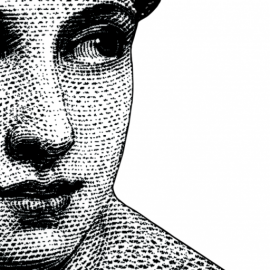A spiritually and culturally dead future devoid of art and meaning

Sean T. Collins joins us again today to write about vampires and class warfare and the great new Sexy Beast series based on Jonathan Glazer's 2000 classic. Collins also recently wrote for Hell World about Glazer's film The Zone of Interest (up for five Oscars including Best Picture and Best Director).
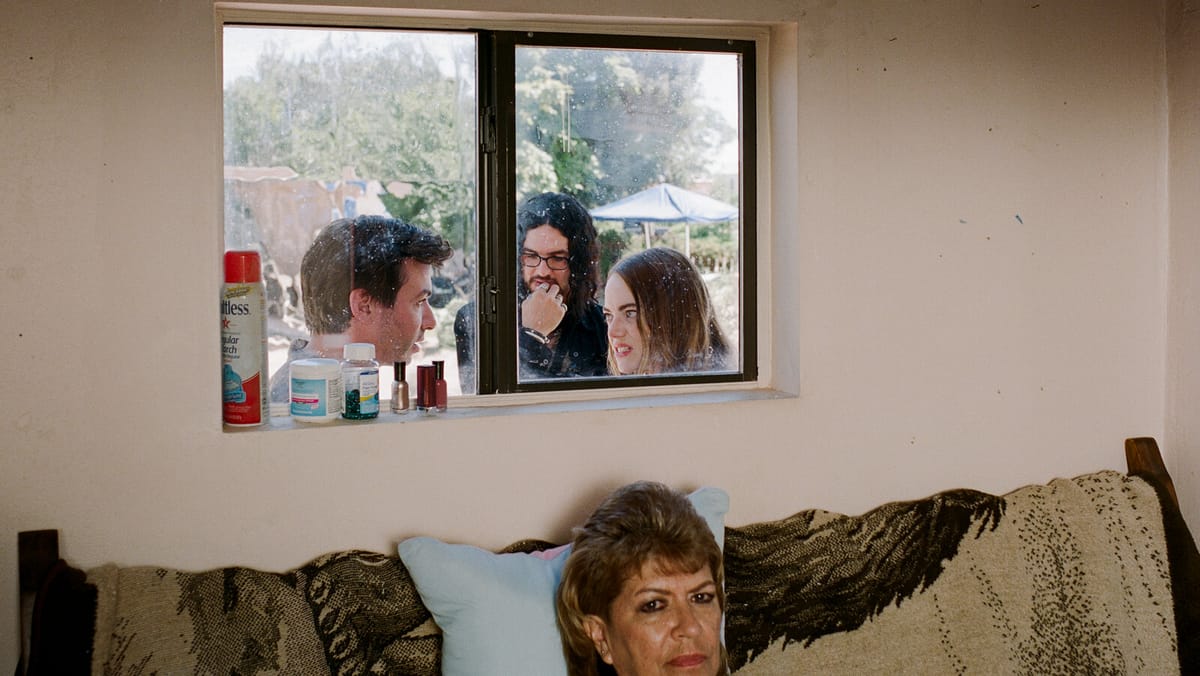
As always I'd appreciate it if you helped me pay our great contributors with a subscription. Thanks for thinking about doing that buddy. If you can't maybe tell a friend to sign up!?
The next top 5 songs thing is going to be about David Berman fyi so stay tuned for that sometime next week.
First the shitty news.
A bill advancing through the legislature in Florida proposes a solution to the issue a homelessness in the state. A final one you might say. It would make it illegal for counties to allow people to sleep in public and further would make it possible for property owners to sue the county if they are disturbed by the presence of the unhoused. Instead those people will be placed – or concentrated if you will – into a state run facility they're calling The Florida Motel.
DeSantis’ casts the legislation as “ensuring public order, ensuring quality of life for residents, ensuring that people’s property values are maintained.”
But he essentially seems to want to make homelessness illegal.
Touted as “cutting edge,” the idea is to keep homeless people far from the view of selfish people offended and threatened by reminders of the plight of the less fortunate.
Where would we dump the homeless in South Florida? In the bug-ridden Everglades?
Please do not give them any ideas.
If you never read it please go back to this Hell World by Andreina Kniss about the idea being floated in nice liberal California – by hippie Bill Walton of all people! – to put the homeless in camps in the desert.

The reality is we have tried nothing that addresses the housing market that leaves people without a home. Nothing but punishment.
The discomfort of seeing the unhoused living in squalor leads many to a crisis of conscience. Most don’t have the language to recognize the fact that the people on the streets are purposeful victims of capitalism. And none of us “regular folk” want to think about how close each of us really are to finding ourselves out on the street, struggling to survive. So we end up telling each other that it's their own fault, or that these people live on the streets by their own choice. We end up concluding that the unhoused are bad people who purposely shun the plentiful help available. That we have so generously offered. In this alternate reality, recreated daily by city leaders looking to avoid accountability for the ballooning of the unhoused populace, it is the homeless themselves who must be fixed. No further analysis of our economic system or societal values needed. It’s a comfortable and conscience-easing conclusion. And when you come to believe it, then you can be reconciled to the idea that your unhoused neighbors are not part of your community at all. They are threats to society rather than victims of its fundamental structures.
The most illiterate men alive have been gassing themselves up this week because the computer is getting some small degree better at producing empty vessels that have the general contours of a video game cut scene. Delighting in the approach of a spiritually and culturally dead future devoid of art and meaning.
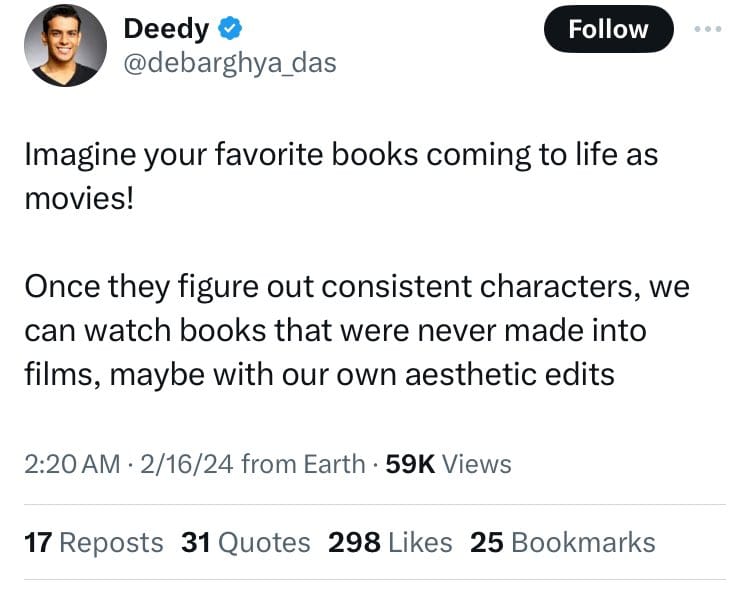
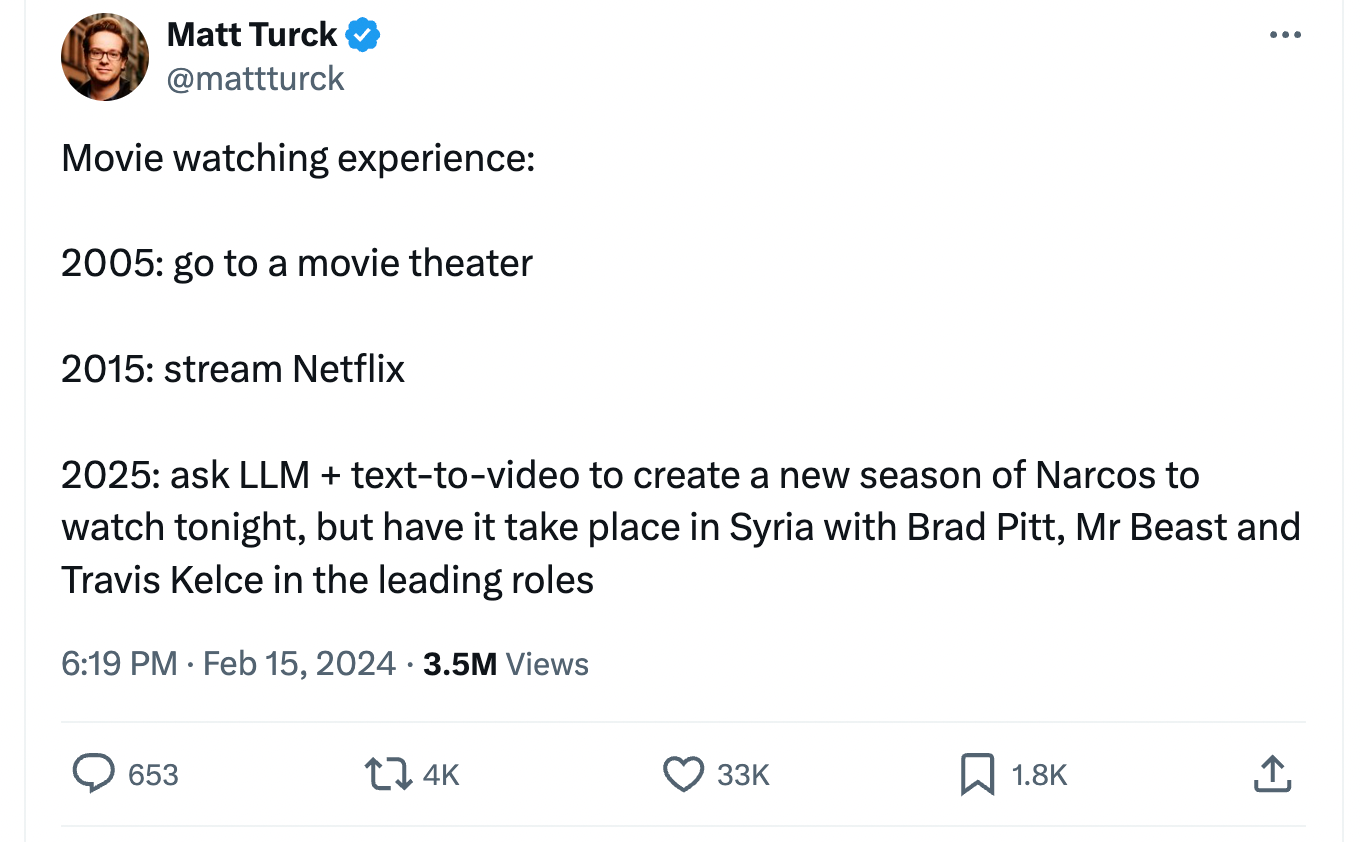
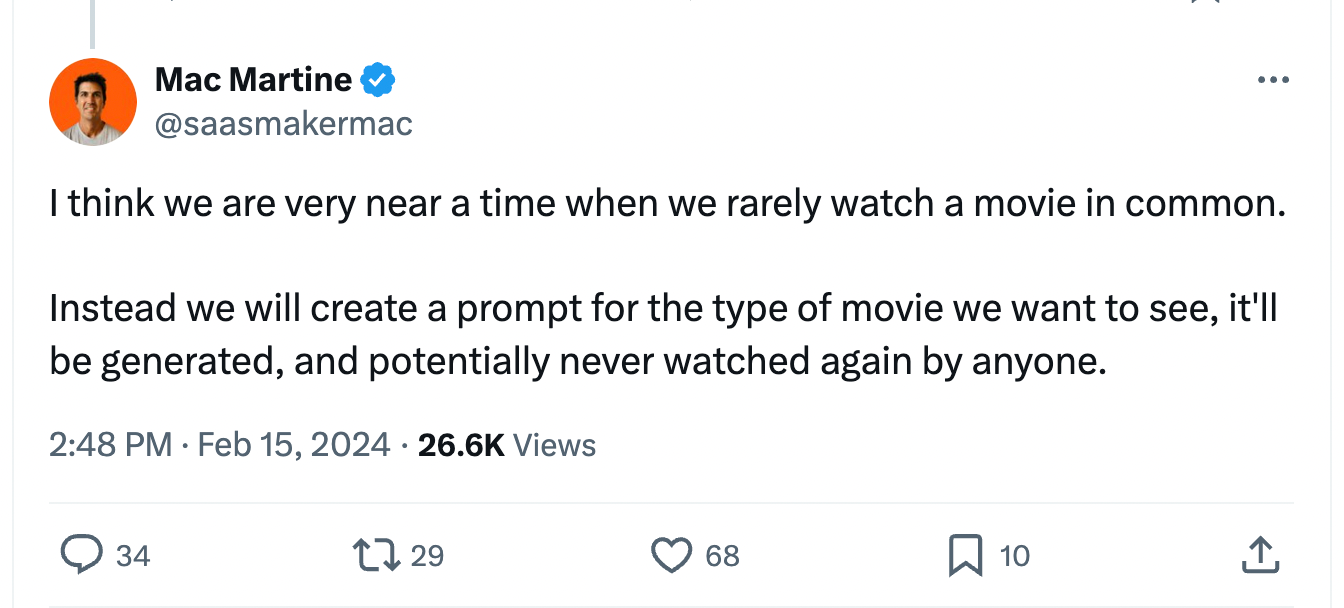
You do have to admit that Narcos season starring Brad Pitt and Mr. Beast and Travis Kelce sounds pretty sick though.
There's only one flaw I can see in this AI-generated world of six fingered bikini babes with death behind their eyes and photorealistic Family Guy pornos: I don’t understand where they think their personalized sense of aesthetics they plan to input into the computer is going to come from in the first place when all human artists have been driven out of business.
If you want something perfectly tailored 1:1 to your own taste meant solely for you to experience alone you can already do that just by sitting there and thinking about it buddy. Skip the middle man step of the computer. It's just going to put it back in your brain anyway.
This probably applies to all of you – people in possession of human souls who have at least on occasion felt the divine in a work of art – but everything I write myself and everything I love to read or listen to or watch has one bedrock foundation to it which is this:
Oh my god I am alive right now and you are alive right now and someday we will not be but for the duration of this we are both stupidly and beautifully alive.
Please bear witness to my humanity and take some small portion of it for yourself.
Sam Thielman's piece for Flaming Hydra on this AI world the Tech Dunces and Business Overlords are trying to birth as we speak was quite good.
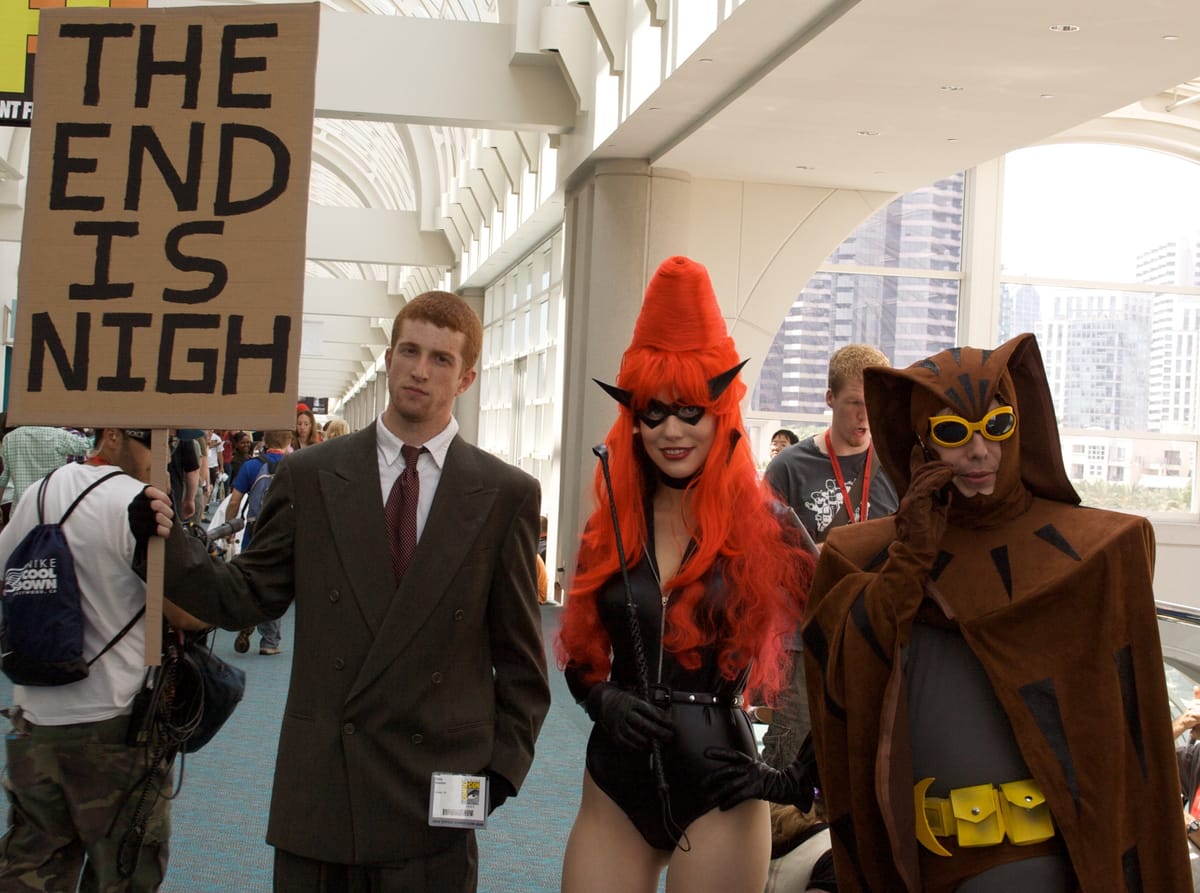
In this reading, artists are essentially waitstaff, there to take orders quickly and accurately and make a bare minimum of small talk. If they can be cut out completely, so much the better; film and TV and novels and comics and music will not operate even as restaurants, but as vending machines. This suits the intellectual-property-industrial complex just fine, because it hardens the wall between creative workers and the fair compensation to which they are entitled—a deficit that formed the basis of big entertainment libraries like the Marvel and DC universes in the first place.
Now, it appears, we are on the cusp of a kind of shareholder’s dream: The art out of which our culture’s greatest benefactors have been swindled will be fed into a big machine that can shit out “new” material devoid of any personality or feeling; a perfect mirror, reflecting back the onanistic demands peculiar to each customer’s momentary whims.
There's too much good stuff to quote from this piece in The New Inquiry about attending the Forbidden Courses classes at Bari Weiss and company's fake school the University of Austin but here's a particularly demonstrative passage:
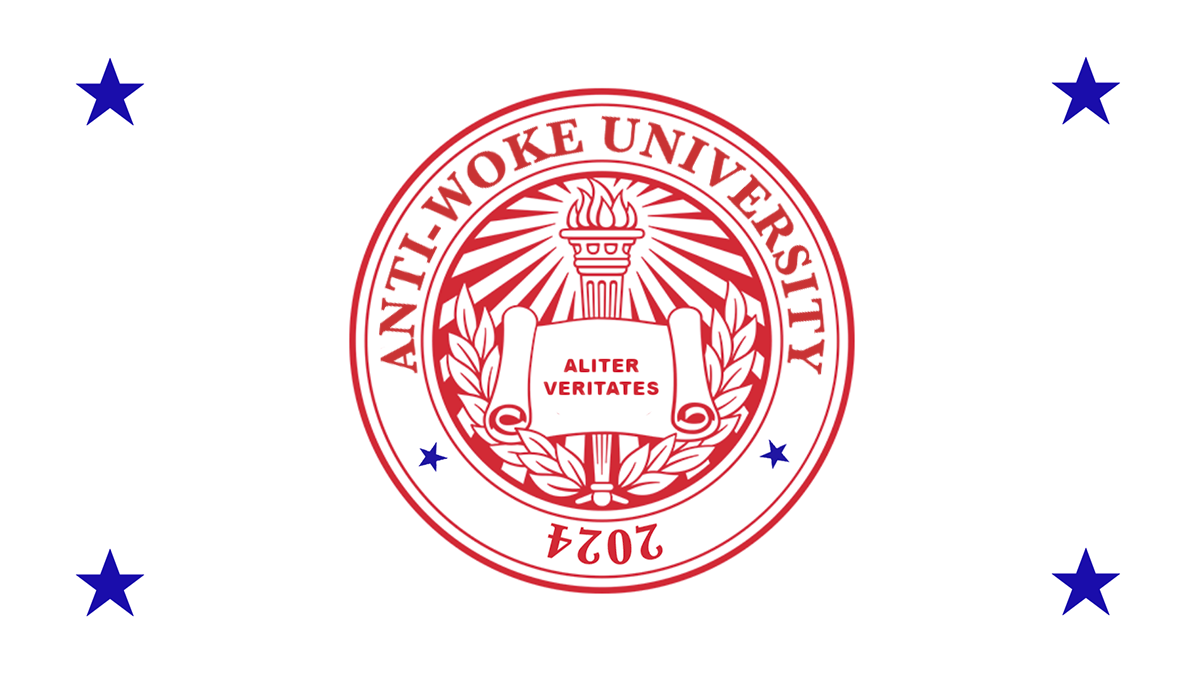
UATX students would spend plenty of time in the cafeteria throughout the week, but the commencement dinner was held in “The Pecan Room” of a different building, amid wood-paneled walls and oil paintings. We were served some kind of marinated chicken and left to mingle, us the well-groomed top of the top, us the Forbidden. We numbered 50 or so. We came from places like Harvard and Stanford and UChicago and MIT and U Penn. There was James, who studied computer science. Then there was Cameron, who also studied computer science. David and Peter studied computer science, while Luke and Albert studied computer science. As for Mike and Jason, the former studied computer science, whereas the latter studied computer science. Ethan was not unlike Max, in that both studied computer science. Some people studied business, too.
...
Pano Kanelos, president, stood up. It was time for the opening remarks. Our chatter lulled, and he began to speak in gentle, benevolent tones. He told us that we weren’t starting a university; we were a university. This is what a university looks like: people coming together for conversations, much like the ones we’d been having over our complimentary chicken dinners. “Dia-logue,” he said. “From the Greek, logos.” Two rational beings, engaged in rational discourse. He smiled. We smiled. And with little further ado, he introduced Peter [Boghossian], whom the other students had not yet had the good fortune of meeting. Peter, Pano told us, was “kicking butt in the righteous name of freedom.”
Peter springs to the center of the room. The air pressure changes. A buzz, a hum, a current about us. He brims with a frenzied energy. Something is happening. He is going to give us a taste of what’s to come, he says. This is the kind of intellectual activity we’re going to experience at UATX. We’re going to grapple with big issues. We’re going to be daring, fearless, undaunted. We’re going, he says, to do something called “Street Epistemology.”
What is Street Epistemology? He’ll demonstrate. It’s one of two things he does, the other being jiu-jitsu. “I don’t have a life,” he says. “I talk to strangers and I wrestle strangers.” But before we can do Street Epistemology, Peter needs to think of some questions.
He turns his back to the audience, hunches slightly and strides, stroking his chin. He is Rodin’s thinker set in manic motion; he is a relentless logician in his study at midnight; he is a frantically philosophical gremlin … —BAM! He wheels around and stalks forward and slings his index finger out toward a student, demands of him whether climate change is real?! and how certain is he?! and why?!—BOP! He points at another student, asks whether gender is a social construct, whether trans women are women?! He cites Socrates and The 7 Habits of Highly Effective People. He staggers and weaves: as a boxer dances, so Peter lectures. He is the professor you never had; he is a squall of raw intellect; he is Robin Williams in the Dead Poets Society, but ripped. He is putting a gun to the head of your most precious assumptions.
And then it is over. That, we have learned, is Street Epistemology. It is asking the hard questions of another, and not refuting them when you disagree, but continuing to ask “why?” and “how certain are you?” until the temple of their convictions crumbles, and you can help them build a newer, sounder one.
The commencement dinner has ended, and we file outside to the buses. Tomorrow the Forbidden Courses begin.
Such tantalizing yet forbidden ideas! So taboo they're shared by the most powerful political entity in the country. He's Samuel Alito taking another shot at Obergefell this week and arguing that you cannot strike a bigot from a jury in a case involving a lesbian because it violates their Constitutional right to be a bigot.
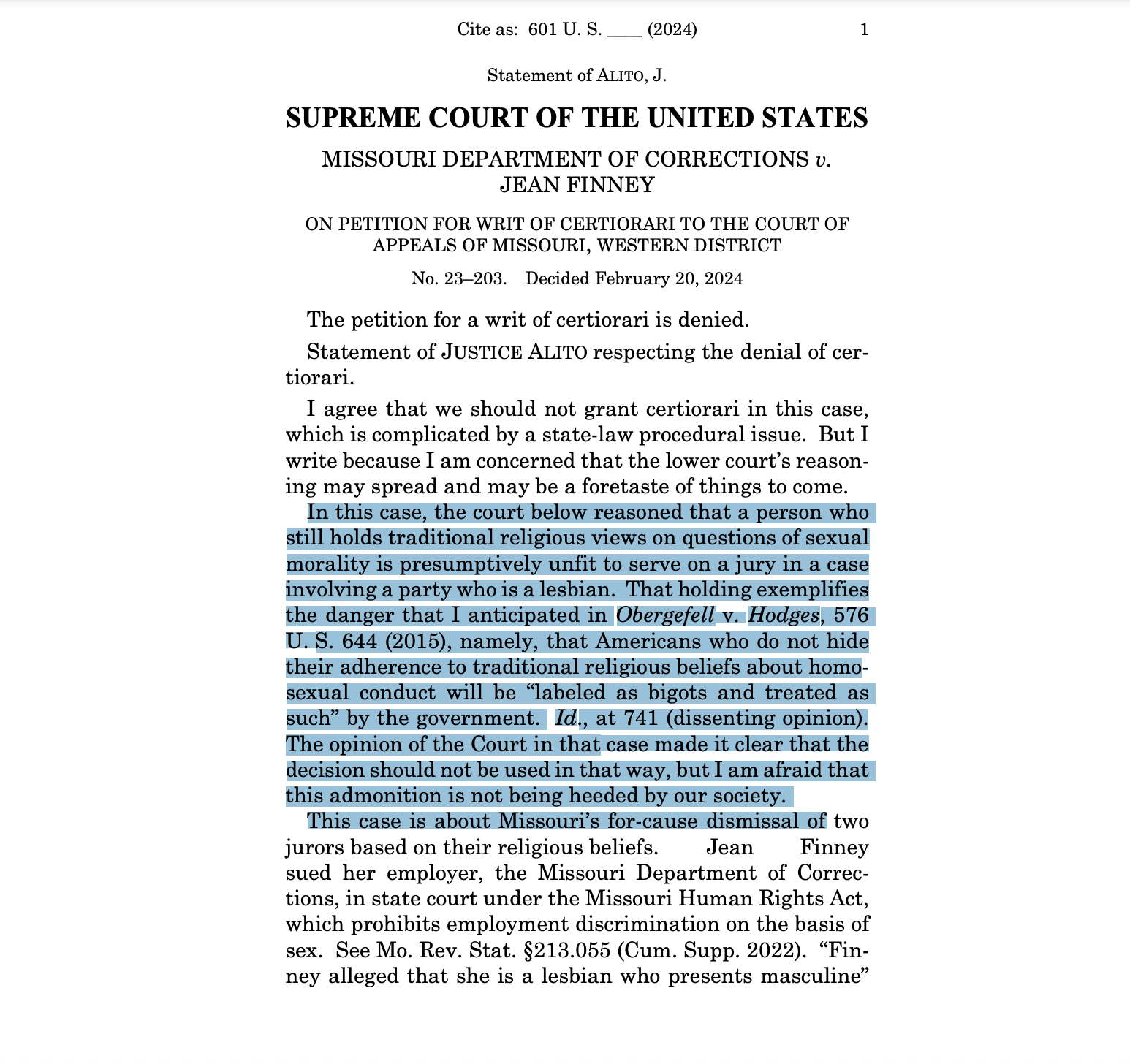
These hateful fucking losers playing grab ass down in Texas are right that their ideas are dangerous it's just not themselves that they're dangerous for. They're dangerous for people like the dead sixteen year old in the next story.
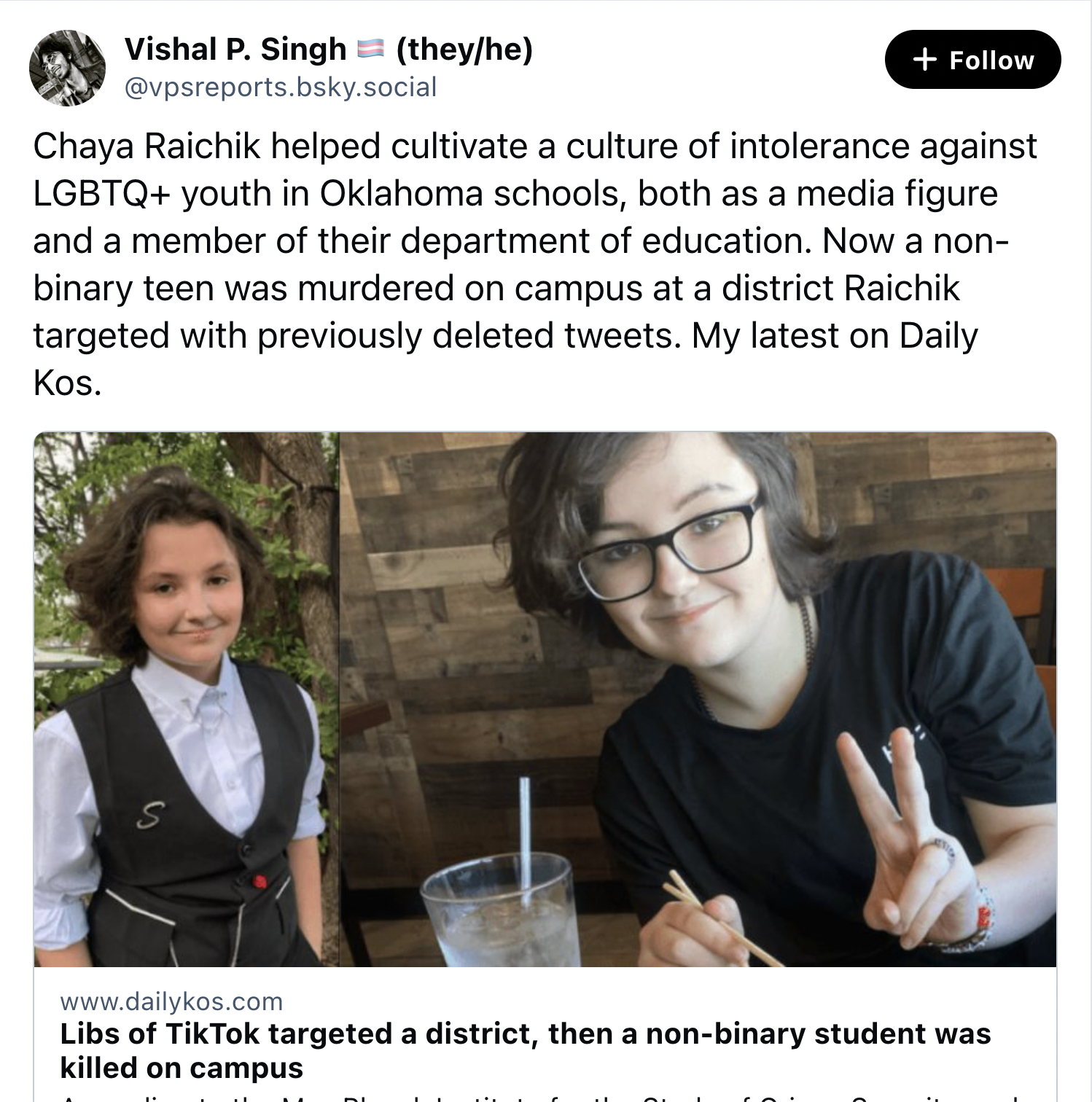
This month, a non-binary 16-year-old student at Owasso High School was brutally murdered in the girl’s restroom. According to local news outlets and family, Nex Benedict was beaten by three older female students. The mother of Benedict’s best friend told KJRH News that "one of the girls was pretty much repeatedly beating [Benedict’s] head across the floor.” Reports say Benedict was unable to take themselves to the nurse’s office after a teacher finally intervened in the brutal assault. For reasons that remain unclear, Owasso High School refused to call an ambulance for 16-year-old Nex Benedict, who died from their injuries in the hospital the next day. A motive for this killing has not been shared by law enforcement, but we know that schools in Oklahoma have been specifically pushing violent eliminationist rhetoric against transgender and non-binary youth— a fact exemplified by the state’s hiring of Chaya Raichik following her incitements of terror against the state’s schools over LGBTQ+ rights.

This is just such a heartbreaking fucking punch man. I can't write down what I think about Chaya Raichik and Ryan Walters the hateful fucking piece of shit superintendent of Oklahoma schools so let's all just sit here and think silently.
The Independent has more on the story.
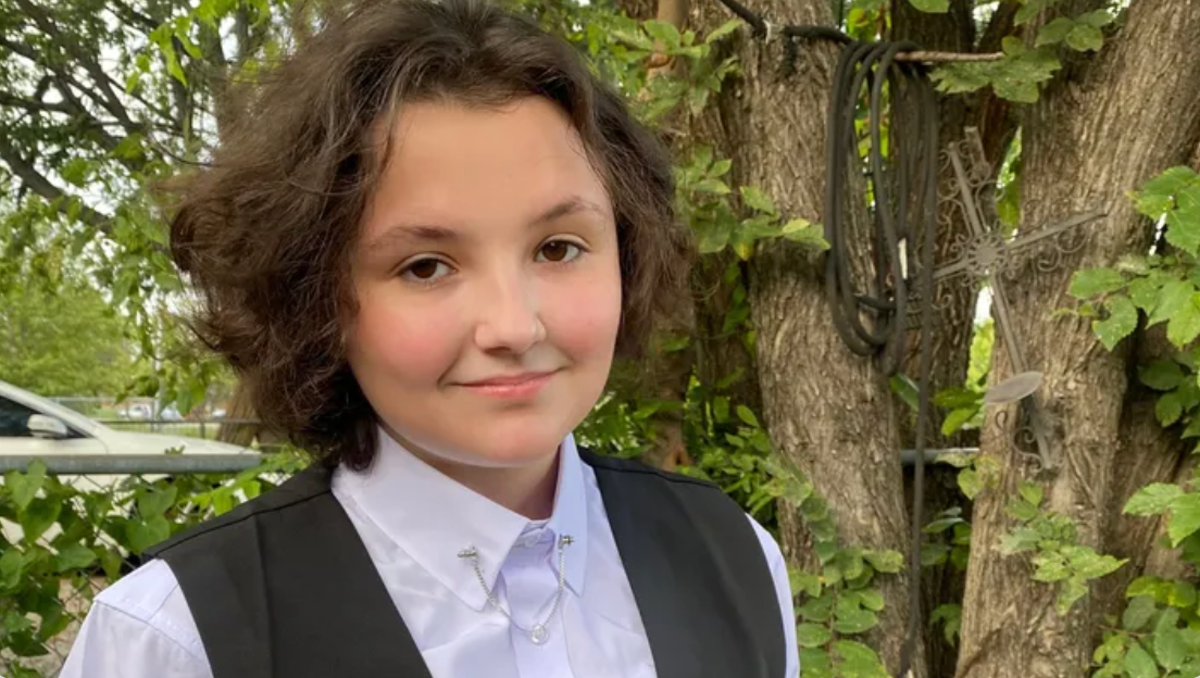
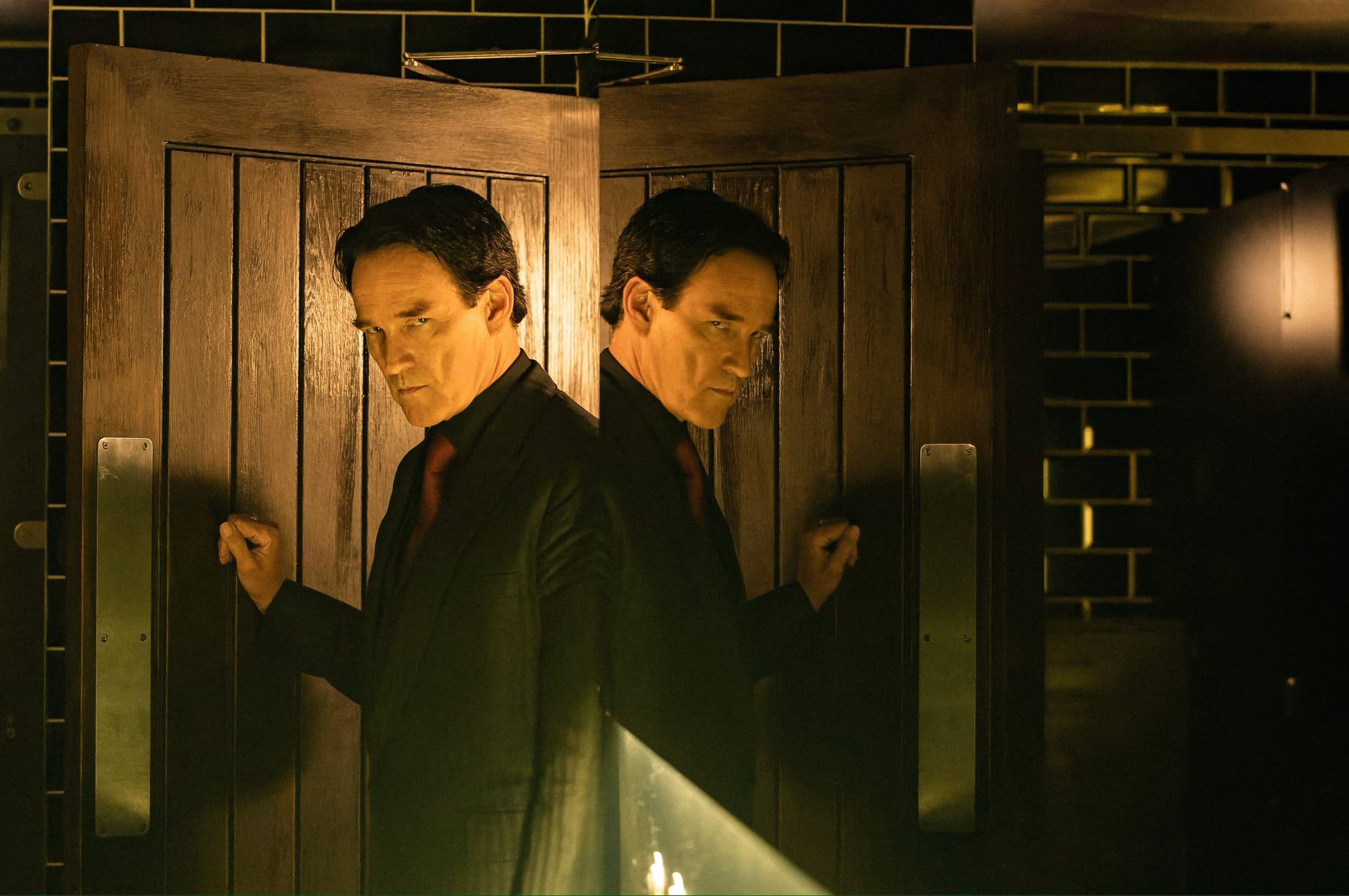
Vampire of London
by Sean T. Collins
“All of this, every building within a Mile of Hyde Park Corner, belongs to one man. Medieval land grabs, the feudal system, hereditary peerages, entitlement — and we just let ‘em. God save the Queen, eh? You know, the French had it right with dear old Madame Guillotine. That’s what we should do, Gal. Knock some heads in baskets.” —Teddy Bass, Sexy Beast (Episode 7)
The vampire in popular culture isn’t merely a creature of the night, he’s a creature of the Right. The granddaddy of them all is Count Dracula, not Mister Dracula. The heir of decadent Eastern European aristocracy, his scheme to submerge London beneath his blood-dimmed tide in Bram Stoker’s original novel involves rampant real-estate speculation. Today he’d have property in all of those hideous New York City skyscrapers full of condos owned but not actually occupied by various Russian business gangsters.
Kurt Barlow, the nosferatu who destroys the small town of ‘Salem’s Lot in the book by Stephen King, is an ancient Austrian nobleman. Too hideous to be seen publicly, he adopts the guise of an unseen eccentric antiques shop owner, a pretty good way for an immortal rich parasite to lie low in Maine. The vampire Lestat comes from a failing French noble house and grew up in a castle, while his lover, Louis, owned a plantation, showing that America’s native aristocracy is not immune.
There are certainly exceptions — the leather-and-denim dirtbags of Near Dark and The Lost Boys come to mind — but often those exceptions are reactionary in their own way. Just by way of a for instance, all three pillars of the post-millennial vampire romance boom — Twilight and True Blood and The Vampire Diaries — feature sexy ex-Confederate soldiers turned hunky, tortured undead. Your average vampire antagonist is a posh predator, very literally draining the life out of his lower-class victims. He is at home in the C-suite as well as the coffin.
But Teddy Bass? He’s a vampire of a different color.
As fans of Ian McShane’s luciferian turn as Teddy Bass — the sexually fluid overlord of London’s underworld in director Jonathan Glazer’s 2000 British gangster classic Sexy Beast — can tell you, the so-called “Mr. Black Magic himself” is merely vampiric, not a literal vampire per se. Gliding around in black-on-black suits, voice a low purr, smiling in a way that never reaches his eyes (‘Salem’s Lot describes vampires smiling in much the same manner), Teddy Bass is a seducer as well as a destroyer. He uses his lover, a bank executive, to gain access to its vault full of valuables, then murders the man with no more stress or remorse than someone doing a mildly unpleasant chore like washing the dishes.
Every second that the lovable ex-thief Gal Dove (Ray Winstone) spends in his presence is spent in the presence of death. That’s obvious from the start, it becomes painfully obvious during their white-knuckle car ride together at the end of the film, and it’s obvious until the very last moment Teddy drives away. Ben Kingsley’s ferocious performance as Ted’s belligerent oddball underling Don Logan gets all the attention in that movie, but real heads know a Dracula when they see one.
Even some of the biggest Sexy Beast fans I know — and given that each of Glazer’s subsequent films has been a severely disturbing masterpiece in one way or the other their ranks grow by the year — have no idea that there’s a Sexy Beast prequel series running right this moment. They certainly have no idea that it’s excellent. It’s anchored by complex, humane performances by James McArdle, Emun Elliott, and Sarah Greene as younger versions of Gal, Don, and Gal’s true love Deedee respectively. All of them echo the original work done by Winstone, Kingsley, and Amanda Redman while remaining different enough to illustrate that these characters are not yet the people they become by the time the film begins.
Creator and showrunner Michael Caleo mines every character for maximum pathos, particularly in his handling of the dawn of Gal and Deedee’s relationship, which occurs when both are committed to other people; the result is as romantic, painful, and real as any romance I’ve ever seen on TV. But the show doesn’t skimp on the nasty gangster shit either, and it’s shot, scored, and soundtracked with the stylish propulsiveness of UK crime thrillers of yore.
However good I’m making it sound, it’s better. Go watch it. It’s on Paramount+, and you may not even have canceled the subscription you got to watch The Curse yet.
Which brings us back to Mr. Black Magic himself. The Teddy Bass of Sexy Beast the television show is played by a TV vampire of considerable experience: Stephen Moyer, True Blood’s Bill Compton. Watching Moyer slink his way through this show, leaving a trail of dropped drawers and broken bodies in his wake, you can’t help but feel that this is the kind of monster Moyer had hoped to play all those years ago. Finally, he’s got something he can really sink his teeth into.
Younger, hungrier, and more dynamic than the older version played by McShane — who by that point is firmly on top of the pyramid — the TV Teddy is vampire-coded to a major degree. He’s quiet, pale, raven-haired, black-clad with red accents, largely nocturnal, possessed either by brooding malice or sinister good cheer and nothing in between. He kills men without compunction, rapes men without shame. He tends not to step into a home unless he’s been invited. And once he is, all are powerless before him.
In the most recent episode at the time of this writing, Teddy wheedles his way into the manse of his quarry, the corrupt aristocrat politician Sir Stephen Eaton (the marvelously named Julian Rhind-Tutt), by seducing his wife’s best friend from her university days. “He walked right up to me, this close,” she recalls giddily, “and he said ‘Everyone in this room, man and woman, wants to fuck me, but I only want you.’” Teddy fingerbangs the friend under the table at dinner, using the same hands he used to nearly shatter the bones of a loudmouth at the party, to the delight of all onlookers. By the end of the evening even Sir Stephen is tenderly brushing his hand against Teddy, even though he knows, for a fact, that Teddy has been spending the past few weeks using Gal and Don to rob him blind. He is irresistible.
But he is also angry, righteously angry. In the monologue that opens this piece, from the episode that airs this week, Teddy explains to Gal, in a voice more Cockney than Queen’s E, that he loathes the upper class for its thievery and entitlement. It’s not until the season finale that you see his real supervillain origin story in this regard, and I won’t spoil it for you, but it’s ferociously, almost frantically anti-oligarchy, making their menace to the body politic concrete in their menace to the human body itself. Sir Stephen’s enrichment of himself at the expense of the public fuels Teddy’s quest to take him down every bit as much as Teddy’s own lust for power. This man is excited to plan a heist for Guy Fawkes’ Night because he vocally admires Guy Fawkes.
There’s excitement in all this, from a viewing perspective. Violent, sexy, visually sumptuous shows about the sick elite are thick on the ground now, much to my delight. But even the ones in which the rich are punished for their crimes by cosmic justice haven’t directly put us in the shoes of the entity dealing out that justice. Teddy Bass is a monster we want to see unleashed, much as the results can be horrific to watch. He will kill, maim, and abuse anyone he needs to, but the only blood this vampire truly wants to drink is blue.
Sean T. Collins is a critic who has written for The New York Times, Rolling Stone,Vulture, Decider, Pitchfork, and others. He is the author of Pain Don’t Hurt: Meditations on Road House, published by Mutual Skies in 2021. Together, Sean and Julia Gfrörer are the co-editors of Mirror Mirror II, an anthology of horror and erotic comics and art, published by 2dcloud in 2017. They live with their children on Long Island.


